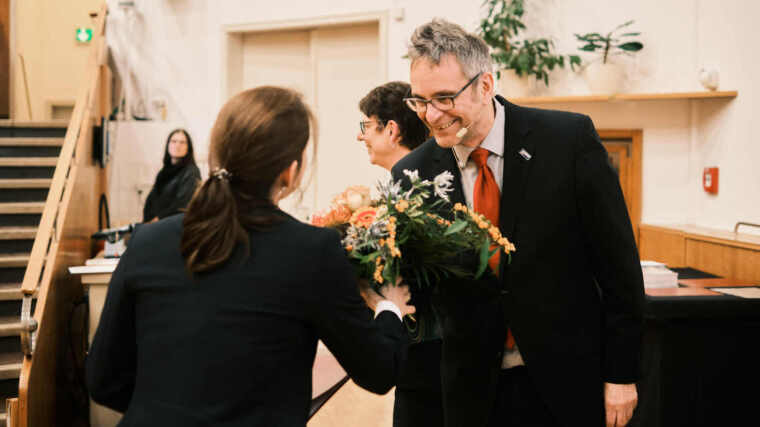
- Light
- Forschung
Published:
Award for basic research
Dr. Kim Lammers (AG Nolte) reached the excellent ambition to the claim breaking new scientific ground in her thesis "Polarisation manipulation in femtosecond laser directly written waveguides in fused silica" .External link
The core topic of her doctorate is the precise control of light propagation in integrated optical waveguide structures. Polarisation plays an important role here, especially when it comes to applications in quantum-based information transmission.
The aim of Kim Lammers' dissertation was to inscribe waveguides in the volume of glasses using ultrashort laser pulses (pulse durations shorter than the millionth part of a millionth of a second) and to control polarisation in particular. She focused on two different concepts.
One was the local implementation of artificially birefringent structures consisting of so-called self-assembled nanogratings. These nanogratings have periods that are significantly smaller than the laser wavelength. This breaks the isotropy of the glass and the light which propagates through these structures undergoes a phase change depending on the polarisation state. The relative orientation of the nanogratings can be determined by a suitable choice of polarisation of the write-in laser.
The second approach pursued by Kim Lammers is based on implementing a thin liquid crystal layer - as used in displays - in the waveguides. By applying a voltage, the liquid crystal molecules are realigned, which changes the polarisation state of the light.
The fundamental prerequisite for controlling polarisation effects with the concepts pursued is the ability to realise polarisation-independent waveguides. This means that not only the birefringence is minimal, but also the polarisation-dependent losses. Kim Lammers has also taken care of this with the help of innovative beam shaping approaches. For her outstanding results, Dr. Kim Lammers was awarded the Friedrich Hund Prize for Basic Research 2022.
Award for Applied Research
Dr. Martin Gebhardt (AG Limpert) received the Applied Research Award for his dissertation on the topic: "Power scaling of few-cycle short-wavelength infrared laser sources for nonlinear frequncy conversion", which made essential contributions to ultrashort pulse laser physics.
Ultra-short pulse lasers with emission wavelengths of about 1 µm have established as an essential tool in basic research and are also steadily gaining relevance in industry. However, there is an enormous demand for new parameters, e.g. shorter pulse durations and higher powers but also new wavelengths, to open up new fields of application. For example, the generation of high gas harmonics with suitable laser systems can provide coherent radiation up to the X-ray range. Coupled with interesting temporal structures, this spectral range offers enormous application potential in semiconductor technology and in high-resolution imaging techniques or spectroscopy of biological samples.
In a remarkable way, Martin Gebhardt succeeded in precisely describing experimental observations by self-developed numerical simulations, thus gaining an extremely profound understanding of the underlying physical effects. By demonstrating several average power world records at pulse durations of a few optical cycles and 2 µm wavelength, Mr. Gebhardt established a new class of laser systems and made a name for in this field of applied research. In an experiment of his own design, he was able to show how power-saving compression to extremely short, intense laser pulses can be cleverly combined with the generation of high gas harmonics in one and the same waveguide. The result is a compact, fiber-integrated source of coherent X-rays. The results of his work are thus of extraordinary relevance, as they demonstrate for the first time the application of scalable laser concepts in coherent X-ray generation and spectroscopy of organic samples.
Friedrich-Hund-Dissertation Award
Since 2019, the Wilhelm and Else Heraeus FoundationExternal link has sponsored the awarding of the Friedrich Hund Dissertation Award by the Faculty of Physics and Astronomy. The Friedrich Hund Dissertation Award recognises theses that stand out for their outstanding scientific content, special originality of solutions and excellent presentation. The prize commemorates the work of Friedrich Hund in Jena de from 1946 to 1951 and publicly highlights special work by young scientists.
-
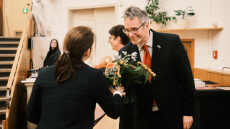
Prof. Dr. C. Spielmann awards the Friedrich Hund Prize to Dr. Kim Lammers.
Image: Andrey Yershov -

Dr. Martin Gebhardt is happy about his award.
Image: Andrey Yershov -
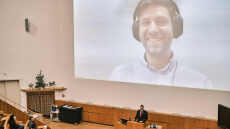
Dr. Martin Gebhardt joins the award ceremony online.
Image: Andrey Yershov -
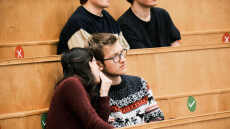
The audience follows the laudations and lectures.
Image: Andrey Yershov -
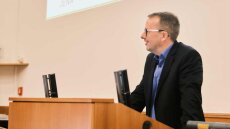
Prof. Dr. S. Nolte gives the laudation for Dr. Kim Lammers.
Image: Andrey Yershov -

Prof. Dr. Stefan Nolte and Dr. Kim Lammers are waiting for the awarding ceremony.
Image: Andrey Yershov